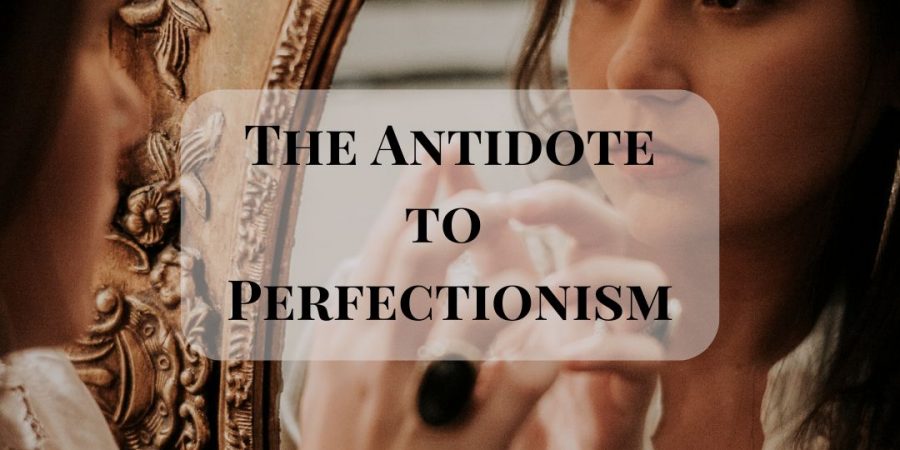I’m a recovering perfectionist. I’m limiting the amount of perfection I’ll allow in my daily thoughts, my interactions with my friends and family, and in my creative process. Limiting, not banning, because perfectionism is an extreme disease. It feeds on phrases like “always” and “never” and “can’t” and “must.” My perfectionism would have a field day with an all out ban. Recovering from perfectionism means being more gentle with yourself and everyone around you. It means getting comfortable with flaws. Your flaws. Their flaws. Minor flaws. And sometimes glaring flaws. It means learning that mistakes are sometimes beautiful. Like a lot of people–women especially, but men are not immune to this–my perfectionism has been both my friend and foe over the years. Maybe that resonates with you. Maybe you’re like me and your perfectionism has earned you fantastic grades or awards or trophies over the years. But maybe you are reaching a point where you see your perfectionism as a shiny idol that you are worshipping at the expense of your creative zest–which is exactly where I’ve found myself this past year.
We perfectionists have a lot of er… *issues* with letting go, don’t we?
We tell ourselves that perfection is an ideal and that we’re just trying to improve ourselves. But then we go too far. We start acting from a place of fear instead of a healthy drive to tune up our weaknesses. Before we know it, that fear takes over and begins driving us. It’s a little Body Snatchery in that you’re kind of sleeping when it happens. At it’s core, perfectionism is not an ideal at all, and it’s certainly not self-improvement. It’s the embodiment of a fear of not being enough. Or even of being too much sometimes. I’ve seen it both ways. We’re either building ourselves up to an impossible standard, or trying to rein in our uniqueness. All so someone else will accept us. (Not really. We’re only seeking external validation because we aren’t validating ourselves.) Either way, perfectionism becomes a prison. You become so locked in the fear of other people’s judgement and criticism that you start to judge and criticize yourself before anyone else even has a chance. It creates a hostile environment in your heart and mind. It poisons your confidence. And that dampens your ability to even recognize, much less shre, those little things of beauty that only YOU can make. And before you know it, you can’t create anymore. Because why bother if you can’t get it just so?
If you’re a perfectionist, too, try this: next time you create something, and you feel the old tendency to prejudge it creeping in, just stop it and take a deep breath. Don’t look for any flaws right away. Everything has flaws and if you look for them, you’ll find them–you’ll find just about anything you go looking for. True? (Except hundred dollar bills. I’ve been looking for one of those for years. Still haven’t come across one in lint trap or the couch. BUT I have found lots of receipts for $100 which proves I had $100. *sigh* ANYWAYS.) There is going to be a time for flaw hunting if you stick with your craft–receiving and working with criticism is absolutely part of being an artist. But a perfectionist is actually ill prepared for the job. You don’t need to be your own worst enemy to handle that crap. You need to be your own BFF. FIRST THING, before you slip into your self critical self sabotage mode, look for what’s GOOD about it. What did you work hard on that came out pretty good? What flowed out of you like water? What do YOU like about it? What made you want to share this thing or feeling with the world to begin with?
Now just sit with that for a minute. That feeling? Is confidence. Confidence is a calm, warm, stable feeling in your solar plexus–the area of your belly right over your navel. Your guts. We call confident people “gutsy” because of this association. There is no wiggle room in this feeling. It doesn’t quiver, spin, or shake. It’s solid and nice and you don’t have to feel around for it for very long because chances are if you’re confident, you’re getting stuff done in that area. Confidence isn’t stuck up or defensive. It’s not a prideful or stubborn attachment to ourselves and our own way of thinking. It’s this nice secure feeling. It’s the knowledge that this might not be perfect–in fact, it probably isn’t–but I think it’s pretty darn sweet. And when you’re feeling that? It’s the best time to improve your work. Not when you’re fearful of others noticing that you’re work is flawed.
